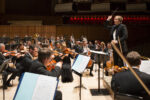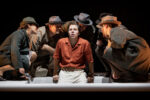Elgar’s Enigma Variations. Royal Philharmonic Orchestra – Review – Hull City Hall

By Karl Hornsey, June 2025
The Royal Philharmonic Orchestra returned to Hull City Hall on Thursday, demonstrating their sublime skills under the baton of conductor Gemma New, with pieces by Britten, Prokofiev and Elgar. This was a fabulous way to end the latest season of Hull City Hall Classics, which will return later in the year for the 2025/26 season.
The evening began with the Four Sea Interludes from Benjamin Britten’s opera, Peter Grimes. There are six interludes to cover scene changes in the opera, but the four here – Dawn, Sunday Morning, Moonlight and Storm – are often played together, and it’s easy to see why. They remain tremendously evocative, conjuring up images of fishermen calmly gathering their nets as dawn breaks, before moving to the crashing finale as the storm rages at sea, bringing with it all manner of chaos and destruction, here brought to life by the brass and horn sections in full flow.
The conclusion of Britten’s work brought to the stage Romanian pianist Daniel Ciobanu, to play Prokofiev’s Piano Concerto No 3. There’s something of a patchwork feel to how the composer created this concerto, starting the composition in his Russian homeland, before leaving it for several years and returning to it on his travels, with the last movement composed in Japan, and the whole thing being completed in Brittany.
“Instantly recognisable”
As is often the case, Prokofiev chucks the proverbial kitchen sink at the thing, and in Ciobanu, has the perfect pianist to pull of a work of astonishing energy and passion. To watch Ciobanu in action is truly mesmerising, as he brings to life the pace and sheer aggression of the work as it builds to a crashing finale. To then be treated to an amusing and varied performance by the pianist, showcasing his range of talents to the full, was the icing on the cake for the first half.
It takes something special to follow that, but thankfully it came in the form of Elgar’s Enigma Variations, played in full, with all 14 of the variations on an original theme. Each of the variations is effectively a sketch of one of his circle of friends and family, including his wife and his agent, and even to himself as well. It’s a thing of beauty when heard in its entirety, but of course, the standout is Nimrod, one of the most instantly recognisable and simply stunning pieces of classical music in existence.
It’s worth being present just to hear that variation, but even more so to hear the work in full, under the baton of such a fabulous conductor and in the hands of a remarkable orchestra.










